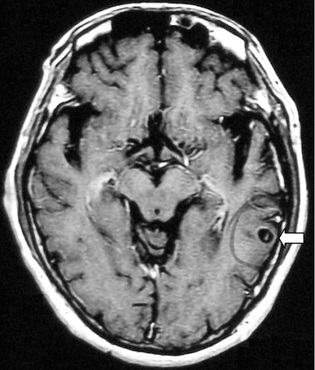This Web site contains links to articles, essays, and videos from around the Web, for general informational purposes only. It is not medical advice. Please rely on your physician and therapist for recommendations tailored to your individual case.
News You Can Use About Mood Disorders, and Other Matters of the Mind
Pennsylvania woman's journey with bipolar disorder told by paper

When the national media portray people with mood disorders, it's often about celebrities behaving badly. But pretty frequently, local newspapers exceed expectations and combat stigma by telling the stories of area residents with mood disorders who have lived terribly difficult lives, fought for periods of recovery, and now help others.
The newspaper in Erie, Penn., tells the tale of Trisha Cloyd, 66, who began having extreme mood swings and erratic behavior as a college student -- a pattern that's heard very often in bipolar patient circles.
Her problems persisted for many years, but in Cloyd's case, having children later on forced her to seek more effective treatment.
"Cloyd said she was in and out of mental hospitals more than 10 times and continued to struggle with life. She was self-employed, held part-time jobs unrelated to her field, and finally couldn't work at all and had to accept government assistance," according to the news article. "At age 35, years after her first bout with mental illness, she gave birth to twin boys. Five years later, she realized she needed help for her illness."
"It got to a point where I just couldn't do it anymore," she said. "I decided I would do whatever it took to get my life back. My boys needed me."
She eventually signed on at Stairways, an Erie mental health agency, and now has a full-time job there.
The newspaper in Erie, Penn., tells the tale of Trisha Cloyd, 66, who began having extreme mood swings and erratic behavior as a college student -- a pattern that's heard very often in bipolar patient circles.
Her problems persisted for many years, but in Cloyd's case, having children later on forced her to seek more effective treatment.
"Cloyd said she was in and out of mental hospitals more than 10 times and continued to struggle with life. She was self-employed, held part-time jobs unrelated to her field, and finally couldn't work at all and had to accept government assistance," according to the news article. "At age 35, years after her first bout with mental illness, she gave birth to twin boys. Five years later, she realized she needed help for her illness."
"It got to a point where I just couldn't do it anymore," she said. "I decided I would do whatever it took to get my life back. My boys needed me."
She eventually signed on at Stairways, an Erie mental health agency, and now has a full-time job there.
Army medic who killed himself, wife abused drugs called 'bath salts'

A Tacoma, Wash., newspaper has published an interesting and very sad story about a well-respected Army medic who killed himself and his wife earlier this year. His young child also was murdered -- perhaps by the soldier or perhaps by his wife before her own death.
The article depicts in tragic detail the soldier's downfall: his recruitment into the military despite his psychiatric history; his struggles with mental problems such as paranoia while on duty; his enjoyment of manic feelings; his failure to take his meds consistently; and illegal usage by him and his wife of a drug nicknamed "bath salts" that apparently had become a problem among soldiers at the army base where he was stationed.
These are not the kind of pleasant-smelling bath salts you might enjoy in your tub. It's a nickname for a powerful inhaled stimulant that has qualities similar to methamphetamine.
"Taking a lot of ("bath salts") for a long time can lead to emotional and physical 'crash-like' feelings of depression, anxiety and intense cravings for more of the drug," says AbovetheInfluence.com, a drug education site aimed at teens.
The Army believes that use of the substance had especially disastrous consequences because of the pre-existing mood disorder.
The article depicts in tragic detail the soldier's downfall: his recruitment into the military despite his psychiatric history; his struggles with mental problems such as paranoia while on duty; his enjoyment of manic feelings; his failure to take his meds consistently; and illegal usage by him and his wife of a drug nicknamed "bath salts" that apparently had become a problem among soldiers at the army base where he was stationed.
These are not the kind of pleasant-smelling bath salts you might enjoy in your tub. It's a nickname for a powerful inhaled stimulant that has qualities similar to methamphetamine.
"Taking a lot of ("bath salts") for a long time can lead to emotional and physical 'crash-like' feelings of depression, anxiety and intense cravings for more of the drug," says AbovetheInfluence.com, a drug education site aimed at teens.
The Army believes that use of the substance had especially disastrous consequences because of the pre-existing mood disorder.
Work troubles, unemployment of the mentally ill are world issues

A new report by an international economic research organization highlights the serious problems of people with mental illness who struggle to keep their jobs, or find new employment. It finds it's a widespread, worldwide issue.
Not so surprisingly, the study found that unemployment is a much more serious hurdle for those with psychiatric illness, and for those who do have jobs, being forced to take time off is far more common than among their peers.
"The overall employment rate for people with mental illness is 10% to 15% lower than people without mental illness; people with mental illness are two to three times more likely to be unemployed," says the Web site Brain Blogger. "In the United States alone, workers with mental health disorders are 50% more likely to experience involuntary job loss and 30% more likely to leave a job voluntarily than healthier counterparts.
"Women, young adults, and individuals with low levels of education are the most likely to experience mental illness. Most mental health disorders are mild to moderate, with depression, anxiety, and substance use disorders being the most common conditions. However, many mental health conditions coexist with physical comorbidities, which also negatively affect productivity."
The Dept. of Labor has various publications with advice about disclosure of disabilities in the workplace, especially written for young adults.
Not so surprisingly, the study found that unemployment is a much more serious hurdle for those with psychiatric illness, and for those who do have jobs, being forced to take time off is far more common than among their peers.
"The overall employment rate for people with mental illness is 10% to 15% lower than people without mental illness; people with mental illness are two to three times more likely to be unemployed," says the Web site Brain Blogger. "In the United States alone, workers with mental health disorders are 50% more likely to experience involuntary job loss and 30% more likely to leave a job voluntarily than healthier counterparts.
"Women, young adults, and individuals with low levels of education are the most likely to experience mental illness. Most mental health disorders are mild to moderate, with depression, anxiety, and substance use disorders being the most common conditions. However, many mental health conditions coexist with physical comorbidities, which also negatively affect productivity."
The Dept. of Labor has various publications with advice about disclosure of disabilities in the workplace, especially written for young adults.
TV spy show portrays CIA agent as bipolar, in and out of control

The Showtime TV series "Homeland" features a character, a female CIA agent, who has bipolar disorder and is trying to keep that fact from her colleagues. An article in the Los Angeles Times looks at the show's plot and tries to assess how realistic it is.
According to the newspaper, the character, portrayed by actress Claire Danes, is forced to go off her lithium and experiences manic symptoms. She has no choice but to reveal her illness to her boss. The character is being treated for her mood disorder by her sister, a psychiatrist.
The article quotes a real-life psychiatrist as saying "it would not be appropriate or advisable for a patient's relative or close friend to prescribe medications and/or provide ongoing psychiatric treatment."
A doctor writing about ethics for a newspaper of the American Medical Association says that, although physicians do, almost universally, treat their own family members sometimes, certain problems can crop up. The official AMA stand is that it's best not to have a relative as a patient except in an emergency.
"Sometimes we as physicians gravitate straight to the worst condition on a
differential diagnosis list when it comes to family," writes the doctor. "Other times, because we are so accustomed to routine complaints that are not signs of serious illness, we
may underestimate the importance of a family member's symptom. And personal
feelings may unduly influence our judgment and actually interfere with a family
member's medical care."
According to the newspaper, the character, portrayed by actress Claire Danes, is forced to go off her lithium and experiences manic symptoms. She has no choice but to reveal her illness to her boss. The character is being treated for her mood disorder by her sister, a psychiatrist.
The article quotes a real-life psychiatrist as saying "it would not be appropriate or advisable for a patient's relative or close friend to prescribe medications and/or provide ongoing psychiatric treatment."
A doctor writing about ethics for a newspaper of the American Medical Association says that, although physicians do, almost universally, treat their own family members sometimes, certain problems can crop up. The official AMA stand is that it's best not to have a relative as a patient except in an emergency.
"Sometimes we as physicians gravitate straight to the worst condition on a
differential diagnosis list when it comes to family," writes the doctor. "Other times, because we are so accustomed to routine complaints that are not signs of serious illness, we
may underestimate the importance of a family member's symptom. And personal
feelings may unduly influence our judgment and actually interfere with a family
member's medical care."
When soda and kids mix, does violence bubble over? Docs aren't sure

Researchers who surveyed Boston teenagers to try to see if there is a correlation between soda pop drinking and violent behavior say they seem to have found an association between the two. But an association may not mean a clearcut cause and effect.
The survey showed that students in the 9th through 12th grades who drank more than five cans of non-diet soda per week reported, in self-descriptions of their behavior, said that they had more violent, aggressive behavior toward relatives, peers and dates.
So will the world be a safer place if youth are denied their Coca-Cola fix? At least one psychiatrist called the study "intiguing," but added that its importance might be limited.
"All that the data show is that high school students who commit violent
acts are more likely to drink sugared and probably caffeinated sodas," he said. "There
could be many reasons why those behaviors are found together that are not
controlled for here.”
A previous study in England found that antisocial behavior among young inmates at a maximum-security prison fell considerably if they were given supplements containing vitamins, minerals and essential fatty acids.
The survey showed that students in the 9th through 12th grades who drank more than five cans of non-diet soda per week reported, in self-descriptions of their behavior, said that they had more violent, aggressive behavior toward relatives, peers and dates.
So will the world be a safer place if youth are denied their Coca-Cola fix? At least one psychiatrist called the study "intiguing," but added that its importance might be limited.
"All that the data show is that high school students who commit violent
acts are more likely to drink sugared and probably caffeinated sodas," he said. "There
could be many reasons why those behaviors are found together that are not
controlled for here.”
A previous study in England found that antisocial behavior among young inmates at a maximum-security prison fell considerably if they were given supplements containing vitamins, minerals and essential fatty acids.
Army teaches troops "positive psychology" to fight depression, PTSD

The military is investing hundreds of million of dollars in classes for soldiers that aim to prepare them psychologically for battle and possible subsequent feelings of depression or post-traumatic stress.
The Defense Dept. contracted with Martin Seligman, a psychologist at the University of Pennsylvania, who is well-known for his theories that people can control their emotions and stress levels by getting a handle on how they process their thoughts.
It's called "Comprehensive Soldier Fitness," and part of it entails learning to cope with the nightmare of seeing buddies killed or hurt, and not taking it personally.
"You can train people to put things in perspective and to decrease the amount of
rumination that they do...," the officer in charge of the program told PBS. "I think those are skills. I think they're learnable and I think they're teachable.
"If you see some horrific thing, you are very likely to be angry and you are very likely to be grieving if it was your friends or something. I think that what we do teach is that don't take responsibility upon yourself to feel guilt, because you are not responsible for those horrific
things happening."
The Defense Dept. contracted with Martin Seligman, a psychologist at the University of Pennsylvania, who is well-known for his theories that people can control their emotions and stress levels by getting a handle on how they process their thoughts.
It's called "Comprehensive Soldier Fitness," and part of it entails learning to cope with the nightmare of seeing buddies killed or hurt, and not taking it personally.
"You can train people to put things in perspective and to decrease the amount of
rumination that they do...," the officer in charge of the program told PBS. "I think those are skills. I think they're learnable and I think they're teachable.
"If you see some horrific thing, you are very likely to be angry and you are very likely to be grieving if it was your friends or something. I think that what we do teach is that don't take responsibility upon yourself to feel guilt, because you are not responsible for those horrific
things happening."
Web columnist thinks Newt Gingrich might be bipolar or hypomanic

A fascinating essay on the Web site Slate depicts GOP presidential candidate Newt Gingrich as possibly having bipolar disorder, based partly on various statements over the years that might be seen as grandiose, unrealistic, or the product of a hugely inflated ego.
Though the column bears the unfortunate, stigma-rich headline, "Is Newt Nuts?" (but remember that columnists usually don't write their headlines), many of the points raised in the piece are interesting enough, especially considering that the candidate's mother was bipolar.
"Often, Gingrich sounds closer to [Charlie Sheen]," writes Jacob Weisberg. "When in an ebullient mood, he grabs the nearest microphone and begins propounding the theory that only he can save the world from imminent destruction. Sometimes Gingrich is leading a revolution. Sometimes he’s preventing one. It doesn’t matter. Only he can do it."
Gingrich mentioned his mother's bipolar illness a few days ago in a news interview in which he spoke about his support for more funding for neuroscience research.
Though the column bears the unfortunate, stigma-rich headline, "Is Newt Nuts?" (but remember that columnists usually don't write their headlines), many of the points raised in the piece are interesting enough, especially considering that the candidate's mother was bipolar.
"Often, Gingrich sounds closer to [Charlie Sheen]," writes Jacob Weisberg. "When in an ebullient mood, he grabs the nearest microphone and begins propounding the theory that only he can save the world from imminent destruction. Sometimes Gingrich is leading a revolution. Sometimes he’s preventing one. It doesn’t matter. Only he can do it."
Gingrich mentioned his mother's bipolar illness a few days ago in a news interview in which he spoke about his support for more funding for neuroscience research.
Facebook creates a way to report suicidal comments of "friends"
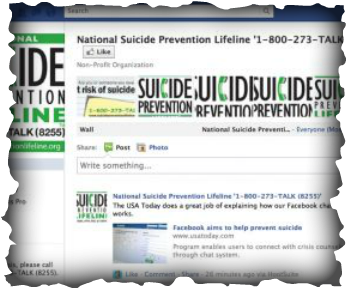
It's always been easy to mark a Facebook post as something you "like." Now it's possible to brand any comment published by users in the U.S. or Canada as something that alarms you -- specifically, something that seems suicidal.
The mammoth social networking site has enabled users in those countries to mark any comment as suicidal, which will then prompt the company to send the potentially suicidal person information on how to call a suicide hotline.
The person who marks the comment as suicidal remains anonymous.
Facebook will direct people to the National Suicide Prevention Lifeline (1-800-273-TALK). The organization lists a number of suicide warning signs, and how to best react to them if someone you care about exhibits them.
The mammoth social networking site has enabled users in those countries to mark any comment as suicidal, which will then prompt the company to send the potentially suicidal person information on how to call a suicide hotline.
The person who marks the comment as suicidal remains anonymous.
Facebook will direct people to the National Suicide Prevention Lifeline (1-800-273-TALK). The organization lists a number of suicide warning signs, and how to best react to them if someone you care about exhibits them.
Debating if depression during pregnancy must be treated or endured

Psychiatric experts are looking at recent studies suggesting a link between the use of SSRI antidepressants during pregnancy and development of autism, or other health problems, in the child after birth. But there's still no agreement on whether it's best for expectant mothers to use the antidepressants or not.
Psychiatric problems such as depression can in some cases be transmitted to children before they are born due to biochemical changes in the mother, but is that sufficient reason for the mother to take antidepressants while the baby is in the womb, which itself can carry a host of risks?
"Perhaps the real issue here is how we choose to treat depression," according to a health writer in a current issue of The Atlantic magazine. "Therapies that use different means to alter the brain (like talk therapy or cognitive behavior therapy) can be as effective as antidepressants, and would not likely pose much
risk to the fetus."
Some doctors have been urging expectant mothers to use caution before taking the medications.
"I think one has to be aware of the potential risks of having these types of drugs during pregnancy, and really think twice before allowing them during pregnancy," Nouchine Hadjikhani, MD of Harvard Medical School, said earlier this year.
Psychiatric problems such as depression can in some cases be transmitted to children before they are born due to biochemical changes in the mother, but is that sufficient reason for the mother to take antidepressants while the baby is in the womb, which itself can carry a host of risks?
"Perhaps the real issue here is how we choose to treat depression," according to a health writer in a current issue of The Atlantic magazine. "Therapies that use different means to alter the brain (like talk therapy or cognitive behavior therapy) can be as effective as antidepressants, and would not likely pose much
risk to the fetus."
Some doctors have been urging expectant mothers to use caution before taking the medications.
"I think one has to be aware of the potential risks of having these types of drugs during pregnancy, and really think twice before allowing them during pregnancy," Nouchine Hadjikhani, MD of Harvard Medical School, said earlier this year.
Antidepressants may make a significant minority feel worse: study

New research out of Yale University suggests that one in five people who take antidepressants actually feel worse than people who take a placebo (sugar) pill.
According to one psychiatrist, the study indicates that psychiatrists need to be attentive to patients who aren't being helped by a particular medication, or who seem to be suffering even more while taking them, and be quicker to provide relief.
"For patients, this study means that they should be telling their doctors when
antidepressants seem to be making them feel more anxious or less energized or
even sadder, as soon as they have those experiences," writes Dr. Keith Ablow, a psychiatrist, author and FOX-News commentator. "Because 'riding it out' for eight weeks or longer, in order to 'get the therapeutic effect' of particular medications may be unwise. When antidepressants don't seem to be improving things, and instead seem to be making a person's condition worse, other medications or other treatment modalities should be used, instead."
Learn more here about how antidepressants can sometimes cause depression or anxiety to get worse, and when a switch in meds or perhaps psychotherapy alone might be a better option.
According to one psychiatrist, the study indicates that psychiatrists need to be attentive to patients who aren't being helped by a particular medication, or who seem to be suffering even more while taking them, and be quicker to provide relief.
"For patients, this study means that they should be telling their doctors when
antidepressants seem to be making them feel more anxious or less energized or
even sadder, as soon as they have those experiences," writes Dr. Keith Ablow, a psychiatrist, author and FOX-News commentator. "Because 'riding it out' for eight weeks or longer, in order to 'get the therapeutic effect' of particular medications may be unwise. When antidepressants don't seem to be improving things, and instead seem to be making a person's condition worse, other medications or other treatment modalities should be used, instead."
Learn more here about how antidepressants can sometimes cause depression or anxiety to get worse, and when a switch in meds or perhaps psychotherapy alone might be a better option.
Cold case file: Judge sends psychiatric patient to jail

Usually when we hear about lawbreakers with psychiatric disorders having their fates decided by the criminal justice system, it's for terrible and violent crimes.
But that's pretty rare, actually. Far more common, but hidden from the public's awareness, are the thousands of cases of people with mood disorders or other mental illnesses who commit minor crimes, seemingly on impulse and with no good reason, and wind up being tossed by a judge into prison instead of being sent to a hospital.
A case this week out of Ontario, Canada is illustrative. A judge sentenced a 29-year-old man to more than five weeks in jail for taking some cologne from a local drug store, before being tackled by a retail cop and being held down on the ground pending his arrest. This, despite his defense lawyer telling the judge that the man has been repeatedly stealing all year because of bipolar disorder and/or schizoaffective disorder. The prosecutor told the judge the shoplifter must be "separated from the community" and refused to divert him to alternative sentencing where he might have gotten professional help rather than a cell.
The judge told the defendant he must get mental health treatment -- though that may be getting harder to find. The province has been slicing the budgets of outpatient mental health services and staff. “We have government officials and mental health professionals lining up to denounce the reality that people with mental illness end up in our shelters and in our jails," a union president there said earlier this year.
But that's pretty rare, actually. Far more common, but hidden from the public's awareness, are the thousands of cases of people with mood disorders or other mental illnesses who commit minor crimes, seemingly on impulse and with no good reason, and wind up being tossed by a judge into prison instead of being sent to a hospital.
A case this week out of Ontario, Canada is illustrative. A judge sentenced a 29-year-old man to more than five weeks in jail for taking some cologne from a local drug store, before being tackled by a retail cop and being held down on the ground pending his arrest. This, despite his defense lawyer telling the judge that the man has been repeatedly stealing all year because of bipolar disorder and/or schizoaffective disorder. The prosecutor told the judge the shoplifter must be "separated from the community" and refused to divert him to alternative sentencing where he might have gotten professional help rather than a cell.
The judge told the defendant he must get mental health treatment -- though that may be getting harder to find. The province has been slicing the budgets of outpatient mental health services and staff. “We have government officials and mental health professionals lining up to denounce the reality that people with mental illness end up in our shelters and in our jails," a union president there said earlier this year.
Doctors seem less likely to give obese patients certain antipsychotics
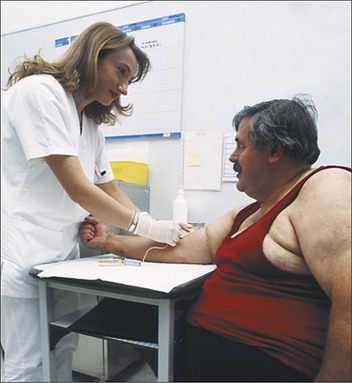
Are physicians cognizant, when they have overweight and obese patients who require antipsychotic medication, that some pills are more likely to cause health problems than others? The answer appears to be yes -- and no.
According to new research, doctors on the whole tend to prescribe certain antipsychotics less frequently if the patients are overweight already and if the drugs are known to create metabolic problems, such as weight gain.
However, the study didn't find that doctors hesitate to prescribe those atypical antipsychotic drugs that are most likely to lead to metabolic problems if the patients have other conditions, such as high blood pressure or high blood sugar, which might be worsened by the use of weight-inducing antipsychotic meds.
According to new research, doctors on the whole tend to prescribe certain antipsychotics less frequently if the patients are overweight already and if the drugs are known to create metabolic problems, such as weight gain.
However, the study didn't find that doctors hesitate to prescribe those atypical antipsychotic drugs that are most likely to lead to metabolic problems if the patients have other conditions, such as high blood pressure or high blood sugar, which might be worsened by the use of weight-inducing antipsychotic meds.
Experimental drug to calm psych patients may be unsafe, experts say
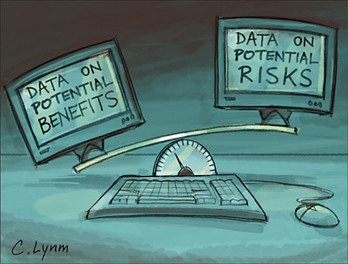
A medication that would be given to agitated bipolar or schizophrenic patients may not be approved for use by the FDA, because the experimental drug -- which is inhaled -- causes some people to have serious breathing problems.
The drug, Adasuve, is inhaled through a vaporizer and in trials was shown to quickly alleviate patients' anxiety. But for some, it also triggered troubling asthma-like respiratory distress.
The drug failed to get approval more than a year ago, and now FDA staff are saying perhaps it shouldn't be accepted this time, either.
The FDA's worries have caused many investors to sell off their shares of the company that makes the drug, says an industry Web site. Will the government accept the drug eventually? It's hard to say. But the site said the FDA sometimes accepts a rejected drug after it's resubmitted a few times, so "persistence and perseverance" could mean the drug will be cleared for takeoff -- despite the risks.
UPDATE (12/13/2011): An advisory panel of the FDA this week gave its approval to the inhaled drug, with some safety conditions such as the screening of potential users for likelihood of bad side effects. Investors have rallied around the company. The FDA is expected to give its final decision early next year.
The drug, Adasuve, is inhaled through a vaporizer and in trials was shown to quickly alleviate patients' anxiety. But for some, it also triggered troubling asthma-like respiratory distress.
The drug failed to get approval more than a year ago, and now FDA staff are saying perhaps it shouldn't be accepted this time, either.
The FDA's worries have caused many investors to sell off their shares of the company that makes the drug, says an industry Web site. Will the government accept the drug eventually? It's hard to say. But the site said the FDA sometimes accepts a rejected drug after it's resubmitted a few times, so "persistence and perseverance" could mean the drug will be cleared for takeoff -- despite the risks.
UPDATE (12/13/2011): An advisory panel of the FDA this week gave its approval to the inhaled drug, with some safety conditions such as the screening of potential users for likelihood of bad side effects. Investors have rallied around the company. The FDA is expected to give its final decision early next year.
Postpartum depression linked to mood disorder later in life: study

New research out of Denmark found that women who experience postpartum depression -- a depressed mood after the birth of a baby -- seem to be more likely to be diagnosed with bipolar disorder later on.
Women who get depressed shortly after childbirth, scientists found, are four times more likely to show bipolar symptoms later than women who are first diagnosed with a depressive episode at a greater length of time after a birth.
Their recommendation? Doctors should be very cautious to watch any new mother who suffers with postpartum depression over the long haul, and monitor for conditions such as hypomania or mania, because postpartum depression could very well be the first surfacing of an underlying bipolar disorder no one noticed before. And a full-blown bipolar episode could follow even several years later after the child arrives.
Experts estimate 15 percent of new mothers experience postpartum depression.
Women who get depressed shortly after childbirth, scientists found, are four times more likely to show bipolar symptoms later than women who are first diagnosed with a depressive episode at a greater length of time after a birth.
Their recommendation? Doctors should be very cautious to watch any new mother who suffers with postpartum depression over the long haul, and monitor for conditions such as hypomania or mania, because postpartum depression could very well be the first surfacing of an underlying bipolar disorder no one noticed before. And a full-blown bipolar episode could follow even several years later after the child arrives.
Experts estimate 15 percent of new mothers experience postpartum depression.
Treatment for sleep apnea works better if partners or parents help
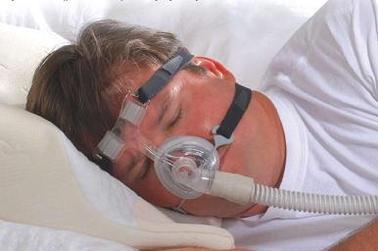
People with psychiatric disorders often run into problems with sleep apnea, a condition that causes people to cease breathing for brief intervals during the night, over and over again. This robs them of deep sleep and causes them to feel tired and sometimes depressed during the daytime, and can also severely tax the heart and other organs.
One of the reasons sleep apnea often comes with mental illness is that psychiatric drugs sometimes help lead to weight gain, and obesity is closely linked to development of sleep disorders in many cases.
Now, new research says that people will be more successful with CPAP therapy -- continuous positive air pressure -- if they get the assistance of partners or parents and don't try to go it alone. CPAP machines, which blow air into the nose and/or mouth all night long, are considered the gold standard of sleep apnea treatment and, if done right, can treat the condition 100% effectively as long as the machines are used. But sometimes the machines aren't used as directed, or patients find them uncomfortable and take the masks off during the night.
Apnea sufferers do much better if partners or parents help to monitor their usage of CPAP machines and try to take part in solving problems that crop up along the way, the new research says. If the patient lives alone, regular phone calls from sleep specialists or nurses can help to address difficulties and make the patient less isolated in the treatment process.
A previous study already had shown that husbands with sleep apnea who were using a CPAP had better outcomes if their wives were cooperative and supportive with regard to the device, rather than sources of negativism or nagging.
One of the reasons sleep apnea often comes with mental illness is that psychiatric drugs sometimes help lead to weight gain, and obesity is closely linked to development of sleep disorders in many cases.
Now, new research says that people will be more successful with CPAP therapy -- continuous positive air pressure -- if they get the assistance of partners or parents and don't try to go it alone. CPAP machines, which blow air into the nose and/or mouth all night long, are considered the gold standard of sleep apnea treatment and, if done right, can treat the condition 100% effectively as long as the machines are used. But sometimes the machines aren't used as directed, or patients find them uncomfortable and take the masks off during the night.
Apnea sufferers do much better if partners or parents help to monitor their usage of CPAP machines and try to take part in solving problems that crop up along the way, the new research says. If the patient lives alone, regular phone calls from sleep specialists or nurses can help to address difficulties and make the patient less isolated in the treatment process.
A previous study already had shown that husbands with sleep apnea who were using a CPAP had better outcomes if their wives were cooperative and supportive with regard to the device, rather than sources of negativism or nagging.
Doc proposes meditation, diet changes as a way to fight depression

In a new, wide-ranging interview with NPR, the controversial author and specalist in mood-food connections, Dr. Andrew Weil, suggested that patients with mild to moderate depression try improving their diet and engaging in regular meditation before they turn to antidepressant medications. He also spoke positively about CBT as a form of therapy.
"...I would really urge you to find out
about the other things you can do first before you try medication...It may include getting your vitamin D levels checked because there's a clear correlation with low vitamin D and poor emotional health," Weil said. "I think it means working in retraining the mind, and that may be going to practitioners of cognitive behavioral therapy..."
Weil, in connection with promoting his new book, Spontaneous Happiness, talked about the potential benefits of healthy eating, exercise and the addition of Omega-3 fatty acids (found mainly in fish oil) to the diet, and also about what he views as the limitations and potential dangers of antidepressant drugs:
"There is a disturbing and growing body of evidence that the major class of
antidepressant drugs, the SSRIs, the selective serotonin reuptake inhibitors, don't work so great, in fact that they barely can be distinguished from placebo even in severe depression now, and it may only be in very severe depression that they show an advantage," he said. "There is also, I think, great concern about a new problem just coming to light. It's called tardive dysphoria.
"That means lingering depression caused by the drugs. You know, we were always taught that depression, however severe it is, is self-limited, that it resolves itself. Well, it doesn't anymore, and one reason why it may not is because the drugs produce the very problem they're meant to treat, and this is so logical....This is called homeostatis, a basic truth of physiology. If you increase serotonin at neural junctions with a drug, the body responds over time by producing less serotonin and dropping serotonin receptors.
"And therefore, it gets you into a worse situation. It's just like trying to treat acid reflux with drugs that suppress acid: You take it away, and you have a worse problem than you did to begin with."
The notion of tardive dysphoria, explained more here, is a relatively new theory that has some doctors believing that a gradual reduction and elimination of antidepressant usage can, in some cases, be of benefit to a depressed person if done with professional oversight.
"...I would really urge you to find out
about the other things you can do first before you try medication...It may include getting your vitamin D levels checked because there's a clear correlation with low vitamin D and poor emotional health," Weil said. "I think it means working in retraining the mind, and that may be going to practitioners of cognitive behavioral therapy..."
Weil, in connection with promoting his new book, Spontaneous Happiness, talked about the potential benefits of healthy eating, exercise and the addition of Omega-3 fatty acids (found mainly in fish oil) to the diet, and also about what he views as the limitations and potential dangers of antidepressant drugs:
"There is a disturbing and growing body of evidence that the major class of
antidepressant drugs, the SSRIs, the selective serotonin reuptake inhibitors, don't work so great, in fact that they barely can be distinguished from placebo even in severe depression now, and it may only be in very severe depression that they show an advantage," he said. "There is also, I think, great concern about a new problem just coming to light. It's called tardive dysphoria.
"That means lingering depression caused by the drugs. You know, we were always taught that depression, however severe it is, is self-limited, that it resolves itself. Well, it doesn't anymore, and one reason why it may not is because the drugs produce the very problem they're meant to treat, and this is so logical....This is called homeostatis, a basic truth of physiology. If you increase serotonin at neural junctions with a drug, the body responds over time by producing less serotonin and dropping serotonin receptors.
"And therefore, it gets you into a worse situation. It's just like trying to treat acid reflux with drugs that suppress acid: You take it away, and you have a worse problem than you did to begin with."
The notion of tardive dysphoria, explained more here, is a relatively new theory that has some doctors believing that a gradual reduction and elimination of antidepressant usage can, in some cases, be of benefit to a depressed person if done with professional oversight.
Now even Fido -- er, PFC Fido -- seems to be suffering stress disorder

Military veterinarians -- those animal docs who help train and treat dogs that aid soldiers stationed in combat zones -- are detecting the canine equivalent of post-traumatic stress disorder in some of the service animals.
About 5 percent of the military dogs, who often are engaged in high-stress activities such as sniffing out bombs, show behavioral changes such as being "hyper-vigilent" or simply ceasing to perform the tasks they were trained to do.
"If the dog is trained to find improvised explosives and it looks like it's working, but isn't, it's not just the dog that's at risk," said a doctor who trains the dogs at an Air Force base. "This is a human health issue as well."
Read about Gina, the troubled German shepherd whose military handlers believe suffered from a kind of PTSD after being on duty in Iraq.
It's all a very new phenomonon, but military vets are trying to help the dogs by using a variety of progressive desensitization, which normally is used to aid people get over their fears, anxiety and panic symptoms by exposing them, gradually, to what is upsetting them. The vets really aren't sure how to use medications designed for the two-legged.
About 5 percent of the military dogs, who often are engaged in high-stress activities such as sniffing out bombs, show behavioral changes such as being "hyper-vigilent" or simply ceasing to perform the tasks they were trained to do.
"If the dog is trained to find improvised explosives and it looks like it's working, but isn't, it's not just the dog that's at risk," said a doctor who trains the dogs at an Air Force base. "This is a human health issue as well."
Read about Gina, the troubled German shepherd whose military handlers believe suffered from a kind of PTSD after being on duty in Iraq.
It's all a very new phenomonon, but military vets are trying to help the dogs by using a variety of progressive desensitization, which normally is used to aid people get over their fears, anxiety and panic symptoms by exposing them, gradually, to what is upsetting them. The vets really aren't sure how to use medications designed for the two-legged.
Relying on meds or alcohol for insomnia may make it harder to sleep

People who tend to use sleep medication, or drink alcohol for the same purpose, over the long-term may actually be making it more difficult for them to get to sleep, new research suggests.
Sleep scientists say that cognitive therapy is probably the best bet for helping to retrain the mind to get to sleep more quickly. But more often, poor sleeps get very anxious about their sleep difficulty, adopting "safety" habits that they believe will help them get more rest -- such as sleep meds -- while in reality the best kind of sleep is that which occurs on its own, as a result of simple tiredness, without huge amounts of effort, researchers believe.
“People who are poor sleepers exert a ton of energy trying to force sleep,” said
one of the study's co-authors. “Sleep is something that has to unfold naturally, so the more you engage in behaviors to try to sleep, the less likely you’re going to fall asleep.”
See this site for a comparison of the relative benefits and drawbacks of sleeping pills versus CBT.
Sleep scientists say that cognitive therapy is probably the best bet for helping to retrain the mind to get to sleep more quickly. But more often, poor sleeps get very anxious about their sleep difficulty, adopting "safety" habits that they believe will help them get more rest -- such as sleep meds -- while in reality the best kind of sleep is that which occurs on its own, as a result of simple tiredness, without huge amounts of effort, researchers believe.
“People who are poor sleepers exert a ton of energy trying to force sleep,” said
one of the study's co-authors. “Sleep is something that has to unfold naturally, so the more you engage in behaviors to try to sleep, the less likely you’re going to fall asleep.”
See this site for a comparison of the relative benefits and drawbacks of sleeping pills versus CBT.
Nursing homes persist in giving atypicals to those with dementia
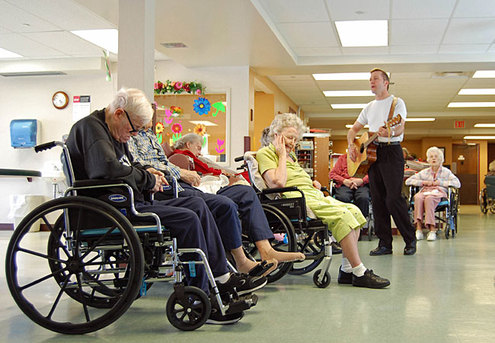
A Senate committee has been warned by a government inspector that far too many doctors are prescribing atypical antipsychotics to dementia patients in nursing homes, in violation of federal policy and at risk of causing these patients death or serious illness.
The drugs, including Seroquel and Zyprexa, are being routinely given out to dementia patients to make them less troublesome and more quiet, despite real health hazards and even if the patients are not experiencing true delusions, the inspector said.
The committee was told that the government needs to step up its crackdowns on the trend and order that Medicare monitor improper prescribing trends closely. "HHS Inspector General Daniel Levinson proposed that Medicare force nursing homes to pay for drugs that are prescribed inappropriately, and potentially bar nursing homes that don't use antipsychotics appropriately from Medicare," reports the Associated Press.
The FDA warned doctors in 2005 that atypical antipsychotics, when taken by elderly patients with dementia, increase death rates, and later issued a similar additional alert regarding all antipsychotics -- old or new.
The drugs, including Seroquel and Zyprexa, are being routinely given out to dementia patients to make them less troublesome and more quiet, despite real health hazards and even if the patients are not experiencing true delusions, the inspector said.
The committee was told that the government needs to step up its crackdowns on the trend and order that Medicare monitor improper prescribing trends closely. "HHS Inspector General Daniel Levinson proposed that Medicare force nursing homes to pay for drugs that are prescribed inappropriately, and potentially bar nursing homes that don't use antipsychotics appropriately from Medicare," reports the Associated Press.
The FDA warned doctors in 2005 that atypical antipsychotics, when taken by elderly patients with dementia, increase death rates, and later issued a similar additional alert regarding all antipsychotics -- old or new.
Foster children are being given psychiatric drugs often: GAO

A new study undertaken by the General Accounting Office and reported by ABC News found that thousands of foster kids in the U.S. are being prescribed antipsychotic drugs, medications for mood disorders and other psychoactive drugs -- far out of proportion to children not in foster homes.
In some cases, foster kids are taking five or more psychoactive medications, sometimes at a very young age.
Researchers looked at foster children in Florida, Massachusetts, Michigan, Oregon and Texas.
ABC reported:
"The GAO found foster children were prescribed psychotropic drugs at rates up to nearly five times higher than non-foster children, with foster children in Texas being the most likely to receive the medications compared to foster children in the other four states. Although the actual percentages of children who received five or more psychiatric drugs at the same time were low in the five states included in the GAO report, the chances of a foster child compared to a non-foster child being given five or more psychiatric drugs at the same time were alarming. In Texas, foster children were 53 times more likely to be prescribed five or more psychiatric medications at the same time than non-foster children." (emphasis added)
The story also quotes a U.S. senator as saying, ""I was almost despondent to believe that the kids under the age of one, babies under the age of one were receiving this kind of medication."
Some of the drugs commonly given to the foster children include Zyprexa, Seroquel and Abilify. The GAO found that the medication often is given to kids at levels higher than recommended by the FDA, or for purposes that are "off label" -- OK'd by a doctor but not endorsed officially by the manufacturer or the government.
In some cases, foster kids are taking five or more psychoactive medications, sometimes at a very young age.
Researchers looked at foster children in Florida, Massachusetts, Michigan, Oregon and Texas.
ABC reported:
"The GAO found foster children were prescribed psychotropic drugs at rates up to nearly five times higher than non-foster children, with foster children in Texas being the most likely to receive the medications compared to foster children in the other four states. Although the actual percentages of children who received five or more psychiatric drugs at the same time were low in the five states included in the GAO report, the chances of a foster child compared to a non-foster child being given five or more psychiatric drugs at the same time were alarming. In Texas, foster children were 53 times more likely to be prescribed five or more psychiatric medications at the same time than non-foster children." (emphasis added)
The story also quotes a U.S. senator as saying, ""I was almost despondent to believe that the kids under the age of one, babies under the age of one were receiving this kind of medication."
Some of the drugs commonly given to the foster children include Zyprexa, Seroquel and Abilify. The GAO found that the medication often is given to kids at levels higher than recommended by the FDA, or for purposes that are "off label" -- OK'd by a doctor but not endorsed officially by the manufacturer or the government.
Scientists give young men violent video games, find altered MRI scans

Does shooting aliens or soldiers on the TV screen, or using a fake gun against an animated auto thief on your computer, have any lasting effect on the mind? Scientists still don't know, but a new study out of Indiana University found that the MRI scans of the brains of many young men appear to change after they've been given violent video games to play.
Specifically, the researchers found violent gaming blunts certain areas of the brain that help people control their emotions and aggression. The test subjects were age 18 to 29.
A 2008 study found that American and Japanese children who play violent video games actually have more violent behavior in real life, as measured by the kids' written descriptions of how they act in daily life.
Specifically, the researchers found violent gaming blunts certain areas of the brain that help people control their emotions and aggression. The test subjects were age 18 to 29.
A 2008 study found that American and Japanese children who play violent video games actually have more violent behavior in real life, as measured by the kids' written descriptions of how they act in daily life.
State attorney general, judge will design programs to aid mentally ill

Ohio already has gone further than many states in establishing special "mental health courts" throughout the state. These are places where people with psychiatric illness, arrested for crimes and potentially facing jail time, can get diverted to treatment, caseworkers, or forms of rehab that don't involve steel bars.
Now the state attorney general and a justice on the state Supreme Court will chair a committee to do even more to actively aid residents who are mentally ill, engage in a crime, and need empathy. The state NAMI group also will be getting funds to help train local police to understand, and better handle, mentally ill people who are in a crisis.
The new initiative is getting praise from the local press.
Now the state attorney general and a justice on the state Supreme Court will chair a committee to do even more to actively aid residents who are mentally ill, engage in a crime, and need empathy. The state NAMI group also will be getting funds to help train local police to understand, and better handle, mentally ill people who are in a crisis.
The new initiative is getting praise from the local press.
Depakote ex-salesman says he was trained to market drug illegally
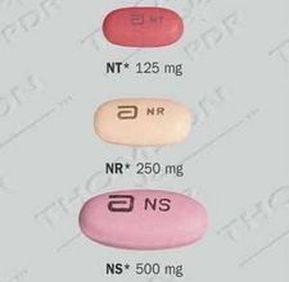
More details appear to be coming forth about how Abbott, the maker of the epilepsy and bipolar disorder drug Depakote, improperly marketed the medicine for conditions for which it was not officially approved.
The ex-employee told a court that he and other staff were told to sell the drug to nursing homes as a treatment for dementia-caused agitation. The FDA did not allow marketing of such uses.
The North Chicago, IL-based firm has already set aside $1.5 billion for a settlement with the government, but might still be found guilty of Medicare and Medicaid fraud in court.
Drug industry experts say that medications are often hawked for non-approved uses, quietly, because even if government penalties are imposed later, Big Pharma typically still keeps the extra profits it made through additional "off label" sales.
You can peruse the original Depakote lawsuit, triggered by whistleblowers from within Abbott, here.
The ex-employee told a court that he and other staff were told to sell the drug to nursing homes as a treatment for dementia-caused agitation. The FDA did not allow marketing of such uses.
The North Chicago, IL-based firm has already set aside $1.5 billion for a settlement with the government, but might still be found guilty of Medicare and Medicaid fraud in court.
Drug industry experts say that medications are often hawked for non-approved uses, quietly, because even if government penalties are imposed later, Big Pharma typically still keeps the extra profits it made through additional "off label" sales.
You can peruse the original Depakote lawsuit, triggered by whistleblowers from within Abbott, here.
Ways to feel optimistic and more thankful amid changing fortune

When Thanksgiving rolled by last week, you may have stopped to think about what you were grateful for -- friends, family, or maybe, at least, the big meal sprawling around the table in front of you. But a Chicago therapist says rough economic times are causing people to feel panic and desperation about their lives. He says these feelings are improvable with practical steps to appreciate the good things in life on the regular basis.
Many of the tips may be familiar to depressed people who have been searching for a way out of the darkness: Make a gratitude list. Find ways to be active. Show up to outside events or gatherings instead of isolating. Seek out unfamiliar situations, to see what happens. Shake things up.
"Things are tough," says the therapist. "But I challenge people by saying, 'If you had to pick a disability, which would you pick?' so they can get a reality check." Easier said...but worth a try?
Learn more about the many benefits of optimistic thinking at this site.
Many of the tips may be familiar to depressed people who have been searching for a way out of the darkness: Make a gratitude list. Find ways to be active. Show up to outside events or gatherings instead of isolating. Seek out unfamiliar situations, to see what happens. Shake things up.
"Things are tough," says the therapist. "But I challenge people by saying, 'If you had to pick a disability, which would you pick?' so they can get a reality check." Easier said...but worth a try?
Learn more about the many benefits of optimistic thinking at this site.
MRI scans may have a side effect: improvement of depression
People with depression appear to get somewhat better after they've had an MRI (magnetic resonance imaging) scan, a new study says.
Researchers found the depressed patients scored themselves as less depressed on a written mood-measurement test after they experienced an MRI scan. Those receiving "fake" MRI scans, to test for a placebo effect, didn't feel nearly as improved.
Some doctors feel magnetic fields do, potentially, have some positive effects on mood, and some psychiatrists are offering transcranial magnetic stimulation on an outpatient basis to depressed patients. These consumers are usually those who have not had luck with antidepressants -- and who can afford it. (The pricey TMS treatments generally are not covered by insurance yet.)
The jury is out on whether MRIs can be a useful tool in the future to fight depression. Doctors don't know why magnetic energy appears to affect moods, or how it could be used precisely. At this point it's an interesting question that raises the hope that, at some point in the future, we may have treatment for depression without medication side effects (at least for some).
Researchers found the depressed patients scored themselves as less depressed on a written mood-measurement test after they experienced an MRI scan. Those receiving "fake" MRI scans, to test for a placebo effect, didn't feel nearly as improved.
Some doctors feel magnetic fields do, potentially, have some positive effects on mood, and some psychiatrists are offering transcranial magnetic stimulation on an outpatient basis to depressed patients. These consumers are usually those who have not had luck with antidepressants -- and who can afford it. (The pricey TMS treatments generally are not covered by insurance yet.)
The jury is out on whether MRIs can be a useful tool in the future to fight depression. Doctors don't know why magnetic energy appears to affect moods, or how it could be used precisely. At this point it's an interesting question that raises the hope that, at some point in the future, we may have treatment for depression without medication side effects (at least for some).
Antipsychotic med causes allergic reaction in some, FDA warns
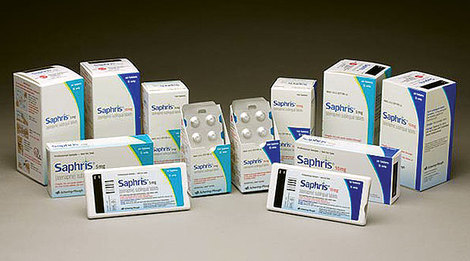
One of the newer atypical antipsychotic drugs, Saphris, causes serious allergic side effects in some patients, a new FDA alert says.
Problems have included wheezing, difficulty breathing, rash and swollen tongue. Sometimes the allergic reactions have occured after a single dose, sometimes later.
In quite a few cases, patients have needed to be rushed to the hospital.
Problems have included wheezing, difficulty breathing, rash and swollen tongue. Sometimes the allergic reactions have occured after a single dose, sometimes later.
In quite a few cases, patients have needed to be rushed to the hospital.
Depression may boost chances of having a heart attack
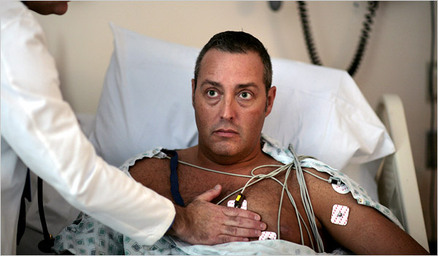
Researchers are now urging that the doctors of depressed patients be especially cognizant of their heart health, based on a new study.
Scientists found that people who have depression take longer to recover from strenuous exercise, which may mean they have a more prolonged "fight or flight" metabolic response to body stress. This, in turn, has been linked to a bigger chance of heart attacks in some cases.
"The take-home message of this study is that health care professionals should
not only address the mental disorder, but also the potential for heart disease
in patients who are suffering from major depression," one of the researchers said.
An older study found a possible link between depression and heart attacks experienced out of the hospital -- the stronger the depression, the greater the danger. Read the paper here.
Scientists found that people who have depression take longer to recover from strenuous exercise, which may mean they have a more prolonged "fight or flight" metabolic response to body stress. This, in turn, has been linked to a bigger chance of heart attacks in some cases.
"The take-home message of this study is that health care professionals should
not only address the mental disorder, but also the potential for heart disease
in patients who are suffering from major depression," one of the researchers said.
An older study found a possible link between depression and heart attacks experienced out of the hospital -- the stronger the depression, the greater the danger. Read the paper here.
More atypical antipsychotics to be available as less-costly generics

Two more antipsychotics, Geodon and Seroquel IR, will soon be available as generics after many years of being on the market as expensive brand-name products. The drugs are losing their patent protection in March and the price could drop as much as half during the next few years.
Another atypical, Abilify, recently also lost patent protection and is already available as a generic. Risperdal, too, can be bought as a generic.
The changes might mean more choices for patients and a larger selection of approved drugs on the formularies of state Medicaid programs, though some hurdles may continue if government programs require special requests from doctors when a patient wants something other than a "preferred" drug.
The new generics are astonishingly less costly than another atypical, Zyprexa, which is still covered by a patent. Click over to this amazing CBS News story to learn how Zyprexa's manufacturer has hiked its price dramatically over the years, and how insurers (or, in some cases, unfortunate patients) have dutifully footed the bill. A hundred Zyprexa pills, without insurance and ordered on line, can cost nearly $2,000.
Another atypical, Abilify, recently also lost patent protection and is already available as a generic. Risperdal, too, can be bought as a generic.
The changes might mean more choices for patients and a larger selection of approved drugs on the formularies of state Medicaid programs, though some hurdles may continue if government programs require special requests from doctors when a patient wants something other than a "preferred" drug.
The new generics are astonishingly less costly than another atypical, Zyprexa, which is still covered by a patent. Click over to this amazing CBS News story to learn how Zyprexa's manufacturer has hiked its price dramatically over the years, and how insurers (or, in some cases, unfortunate patients) have dutifully footed the bill. A hundred Zyprexa pills, without insurance and ordered on line, can cost nearly $2,000.
Patients and scholars now more apt to study content of delusions
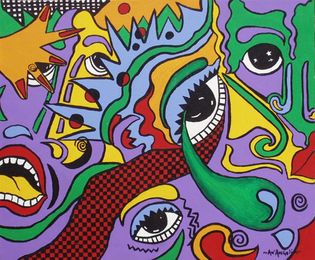
Most psychiatrists probably are most likely to view delusions as evidence of a medical disease and believe that finding the best medication to erase the delusions is their first, or only, task.
Still, this fascinating New York Times story describes how increasing numbers of consumers with psychiatric disorders who have delusions are trying to analayze the content of them to better understand their own personality or philosophy of life (and how that's related to their illness). It's an intellectual and self-empowering pursuit that is drawing more patients together to read one another's autobiographical stories, trying to pinpoint common themes to their delusional ideas so they feel less alone.
The article mentions a new doctoral dissertation that dissects the delusions of several people with schizophrenia, in great detail. It's a pretty amazing piece of research.
Still, this fascinating New York Times story describes how increasing numbers of consumers with psychiatric disorders who have delusions are trying to analayze the content of them to better understand their own personality or philosophy of life (and how that's related to their illness). It's an intellectual and self-empowering pursuit that is drawing more patients together to read one another's autobiographical stories, trying to pinpoint common themes to their delusional ideas so they feel less alone.
The article mentions a new doctoral dissertation that dissects the delusions of several people with schizophrenia, in great detail. It's a pretty amazing piece of research.
To read the Bard or not to read him? It could help doctors diagnose

Doctors should study Shakespeare's plays if they want to better understand how mental turmoil causes symptoms that appear to be physical, a British gastroenterologist writes in a new medical journal article.
The doctor says much can be learned through reading about the psychological struggles of Hamlet, Romeo and Juliet, King Lear, and other Shakespearean characters, and that the playwright depicted mood-illness connections far more often than other writers of his day.
"Shakespeare had an extraordinary insight into the psychology of human
beings, extending to the emotional effects on the body," the physician writes.
Check out this essay for related musings on how some of Shakespeare's characters seemed to struggle with psychiatric illness. And see this story about a theater company that's performing psychiatry-oriented versions of classic plays.
The doctor says much can be learned through reading about the psychological struggles of Hamlet, Romeo and Juliet, King Lear, and other Shakespearean characters, and that the playwright depicted mood-illness connections far more often than other writers of his day.
"Shakespeare had an extraordinary insight into the psychology of human
beings, extending to the emotional effects on the body," the physician writes.
Check out this essay for related musings on how some of Shakespeare's characters seemed to struggle with psychiatric illness. And see this story about a theater company that's performing psychiatry-oriented versions of classic plays.
Thyroid abnormalities can make people feel and act depressed
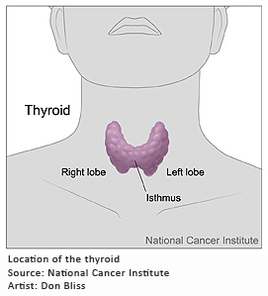
Doctors are increasingly discovering that abnormally low thryoid levels can result in feelings of depression and low energy, according to this New York Times story.
"Too little (hypothyroidism) can cause physical fatigue, weight gain and sluggishness, as well as depression, inability to concentrate and memory problems," the article notes. Doctors are finding that measuring thyroid function through blood tests is often useful and that sometimes, treatment of deficient thyroid production through medication can cause depressive symptoms to improve or even vanish.
WebMD provides more information on the thyroid and depression here.
"Too little (hypothyroidism) can cause physical fatigue, weight gain and sluggishness, as well as depression, inability to concentrate and memory problems," the article notes. Doctors are finding that measuring thyroid function through blood tests is often useful and that sometimes, treatment of deficient thyroid production through medication can cause depressive symptoms to improve or even vanish.
WebMD provides more information on the thyroid and depression here.
Dreams have the power to soothe mind, erase bad memories: study
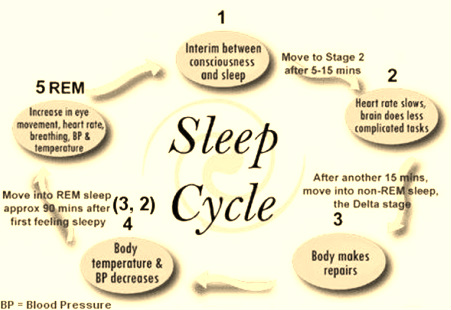
California researchers have found that getting more deep, REM sleep -- in which quality dreaming occurs -- can alleviate people's daytime anxiety by reducing neurotransmitter activity linked to bad memories.
The study found the stress levels were reduced in test subjects who deeply dreamed, like "a soothing balm that removes the sharp edges from the prior day’s emotional experiences." In essance, the access to a deep dream state seems to help us forget recent traumas.
Learn more about how to boost your time spent in REM sleep here.
The study found the stress levels were reduced in test subjects who deeply dreamed, like "a soothing balm that removes the sharp edges from the prior day’s emotional experiences." In essance, the access to a deep dream state seems to help us forget recent traumas.
Learn more about how to boost your time spent in REM sleep here.
Doctors' taking payouts from Big Pharma renews ethics debate
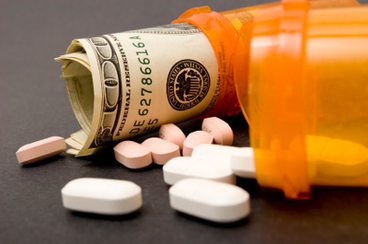
A new investigation by reporters in Texas, discussed in today's New York Times, found that thousands of doctors in that state are greatly supplementing their incomes by taking money from drug companies for such tasks as attending seminars or in compensation for speaking at events.
Ethics questions abound, because in some cases these doctors, including many psychiatrists, are employed by public agencies and their receipt of outside funds from drug firms may be limited by government conflict-of-interest rules. Also, in many cases doctors seem to be writing prescriptions for drugs that are produced by the same companies that are adding to their incomes with these rewards.
This is not unique to Texas, nor is it a new potential problem. See a CBS News segment on the issue of doctors and drug company payments here.
Ethics questions abound, because in some cases these doctors, including many psychiatrists, are employed by public agencies and their receipt of outside funds from drug firms may be limited by government conflict-of-interest rules. Also, in many cases doctors seem to be writing prescriptions for drugs that are produced by the same companies that are adding to their incomes with these rewards.
This is not unique to Texas, nor is it a new potential problem. See a CBS News segment on the issue of doctors and drug company payments here.
Kids on antipsychotics are at risk for diabetes, study finds

Children who take "atypical" antipsychotics such as Risperdal or Zyprexa for bipolar disorder or other mood problems are in danger of developing diabetes, a newly published study says.
This may not be surprising, considering that it's already been shown through research that these drugs may lead to diabetes in adults and weight gain in children. But now this research shows a connection between kids taking the medications and diabetes itself, though the exact reason why the illness develops isn't clear.
Researchers are calling on doctors to carefully monitor kids' weight and blood sugar if they take these pills. Two months ago, a medical advisory panel told the U.S. Food and Drug Administration that physicians should be mindful of just these hazards if their juvenile patients take antipsychotics (variously known as major tranquilizers or neuroleptics).
This may not be surprising, considering that it's already been shown through research that these drugs may lead to diabetes in adults and weight gain in children. But now this research shows a connection between kids taking the medications and diabetes itself, though the exact reason why the illness develops isn't clear.
Researchers are calling on doctors to carefully monitor kids' weight and blood sugar if they take these pills. Two months ago, a medical advisory panel told the U.S. Food and Drug Administration that physicians should be mindful of just these hazards if their juvenile patients take antipsychotics (variously known as major tranquilizers or neuroleptics).
Death of Web wiz kid prompts questions on stress, pressures

The death last week of Internet enterpreneur Ilya Zhitomirskiy, apparently a suicide, is calling the tech business world to look more closely at the high-pressure lives led by young business stars who are building web sites, such as social networking tools, very much in the public spotlight.
This Forbes story tries to make sense of it: "Experts say the overwhelming number of suicides are rooted in pre-existing mental health problems, but that depressive thinking can be exacerbated by a number of issues: stress, isolation, pressure, fear of failure and an unwillingness to reveal weaknesses. In other words, the day-to-day life of a
promising young entrepreneur.
Read more about him in this obituary.
This Forbes story tries to make sense of it: "Experts say the overwhelming number of suicides are rooted in pre-existing mental health problems, but that depressive thinking can be exacerbated by a number of issues: stress, isolation, pressure, fear of failure and an unwillingness to reveal weaknesses. In other words, the day-to-day life of a
promising young entrepreneur.
Read more about him in this obituary.
Being a "morning person" requires patient adjustment of wake hours
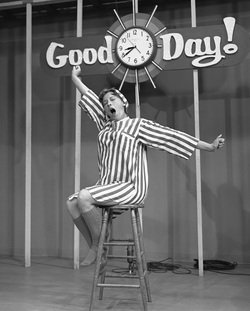
People with mood disorders have sleep patterns that are all across the board and which are highly individual. Some can't seem to go to bed early, but still wake up early. Others go to bed early but sleep far more hours than the average person, late into the morning. And there are many variations in between.
This New York Times story gives advice on how someone (regardless of mood problems) might go about becoming a morning person, i.e., rise early in the day and be alert from the get-go. The process basically requires getting up earlier and earlier each day to reset your body rhythms and to make you feel tired earlier at night. The article includes a quiz to evaluate what type of sleep you are.
This New York Times story gives advice on how someone (regardless of mood problems) might go about becoming a morning person, i.e., rise early in the day and be alert from the get-go. The process basically requires getting up earlier and earlier each day to reset your body rhythms and to make you feel tired earlier at night. The article includes a quiz to evaluate what type of sleep you are.
Do outspoken celebrities with mood disorders help, or hurt?
The new interview below, with television writer Donna Franceschild, is the first I've seen that questions whether it's truly beneficial, for people with psychiatric disorders as a whole, when celebrities "come out" as bipolar.
Franceschild says that celebrities who are public about their mood disorders are often viewed as exotic or creative, and that if their careers are still successful it can be difficult for everyday sufferers of mood disorders: The stars are held up as heroes who haven't failed despite their illness. Friends or family of "ordinary" people with bipolar disorder may, in effect, accuse them of not living up to their potential.
Franceschild says that celebrities who are public about their mood disorders are often viewed as exotic or creative, and that if their careers are still successful it can be difficult for everyday sufferers of mood disorders: The stars are held up as heroes who haven't failed despite their illness. Friends or family of "ordinary" people with bipolar disorder may, in effect, accuse them of not living up to their potential.
To read about 20 celebrities with depression or bipolar disorder, click here.
Genetic, neuroimaging studies hold great promise: Kay Jamison

Scientific research into the hereditary basis for mood disorders, and new types of brain scans that can pinpoint abnormalities, are cause for optimism among mental health patients, said mood scientist Kay Redfield Jamison, PhD in a new magazine interview.
"I think within my own field of mood disorders, genetics is clipping along at a tremendous pace, certainly in the last year or two," said Jamison, author of the classic memoir An Unquiet Mind and a bipolar disorder patient herself. "There are scientists all around the world looking for the genes responsible for bipolar illness and major depression. Also neuroimaging -- ultimately, the combination of neuroimaging and genetics -- is having an enormous impact on early diagnosis, more accurate diagnosis, more specific treatments."
Interestingly, Jamison said her biggest objection to current trends in mood treatment is the diagnosis of young kids with bipolar disorder -- a condition she said doesn't truly become apparent until adolescence.
For a child psychiatrist's take on whether kids really can suffer from bipolar illness, see this article.
"I think within my own field of mood disorders, genetics is clipping along at a tremendous pace, certainly in the last year or two," said Jamison, author of the classic memoir An Unquiet Mind and a bipolar disorder patient herself. "There are scientists all around the world looking for the genes responsible for bipolar illness and major depression. Also neuroimaging -- ultimately, the combination of neuroimaging and genetics -- is having an enormous impact on early diagnosis, more accurate diagnosis, more specific treatments."
Interestingly, Jamison said her biggest objection to current trends in mood treatment is the diagnosis of young kids with bipolar disorder -- a condition she said doesn't truly become apparent until adolescence.
For a child psychiatrist's take on whether kids really can suffer from bipolar illness, see this article.
Trial of device that sends electric impulses to brain helps depression
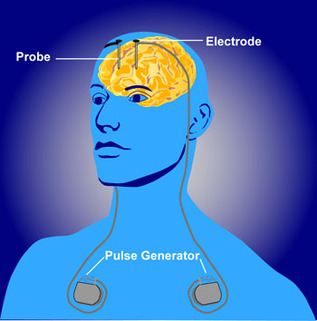
A new study of long-term depressed patients that used a device to emit electrical impulses into their brains seemed to show a significant improvement in many subjects' moods.
The "deep brain stimulation" (brand name: LIBRA) system was experimentally used on 21 patients who had suffered from depression for 10 years without successful treatment by a multitude of medications or, in some cases, electroconvulsive therapy. Nearly three-quarters of patients using the device showed improvement after a year.
The device is implanted in the chest and sends out electric signals into a targeted area of the brain. Read more about the complexities of helping patients with this so-called "brain pacemaker" here. This article points out the treatment is not considered a cure-all but is best combined with solid follow-up care, such as supportive therapy, to help with life problems that have built up over a life of struggling with depression.
Learn more about how brain pacemakers are used for illnesses such as Parkinison's from this promotional video produced by the University of Michigan.
The "deep brain stimulation" (brand name: LIBRA) system was experimentally used on 21 patients who had suffered from depression for 10 years without successful treatment by a multitude of medications or, in some cases, electroconvulsive therapy. Nearly three-quarters of patients using the device showed improvement after a year.
The device is implanted in the chest and sends out electric signals into a targeted area of the brain. Read more about the complexities of helping patients with this so-called "brain pacemaker" here. This article points out the treatment is not considered a cure-all but is best combined with solid follow-up care, such as supportive therapy, to help with life problems that have built up over a life of struggling with depression.
Learn more about how brain pacemakers are used for illnesses such as Parkinison's from this promotional video produced by the University of Michigan.
Huge HMO gets terrible grades in providing mental health services

A new comprehensive report that looks at the quality of psychiatric care provided by California-based HMO Kaiser Permanente says the 6.6-million member organization is doing an awful job at meeting patient needs. With Kaiser, the biggest HMO in the state and one of the most influential managed care companies in the nation, "patients often experience lengthy delays in obtaining services, an overreliance on 'group therapies,' and frustrating obstacles that push many patients to forgo care or seek treatment elsewhere at their own cost," say investigators from the National Union of Healthcare Workers.
The report blasts virtually every aspect of mental health care at Kaiser, calling on state regulatory agencies, lawmakers and local businesses to scrutinize the HMO's policies and procedures carefully and insist on reforms.
The authors urge Kaiser to "adopt the recommendations of its own mental health providers to increase staffing levels at mental health facilities, limit weekly initial intakes per clinician, and establish a binding system of dispute resolution for staffing problems that is managed by a neutral third party in order to ensure enough capacity to meet state requirements for timely access to appropriate care; [and] cease and desist from the inappropriate management of records, [and] misuse of group therapy."
The report blasts virtually every aspect of mental health care at Kaiser, calling on state regulatory agencies, lawmakers and local businesses to scrutinize the HMO's policies and procedures carefully and insist on reforms.
The authors urge Kaiser to "adopt the recommendations of its own mental health providers to increase staffing levels at mental health facilities, limit weekly initial intakes per clinician, and establish a binding system of dispute resolution for staffing problems that is managed by a neutral third party in order to ensure enough capacity to meet state requirements for timely access to appropriate care; [and] cease and desist from the inappropriate management of records, [and] misuse of group therapy."
Psychiatrists can be more active in treating gut problems
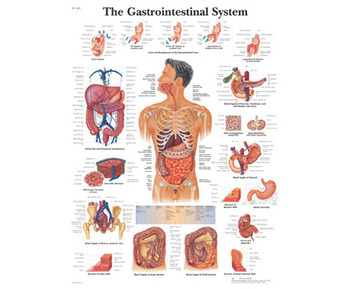
The average psychiatrist isn't very skilled at using either medication or talk therapy to help patients suffering from irritable bowel syndrome or gastrointestinal distress, but a new journal article urges them to get on the ball.
Patients' complaints regarding bowel and GI tract problems often are tied in various complex ways to emotional issues, but psychiatrists may pass patients along to digestive specialists too quickly instead of finding ways to contribute to treatment of these problems themselves, such as the use of certain antidepressants, the author says.
The study says "it is becoming evident that the use of centrally acting
psychopharmacological medications and concomitant psychotherapy should play an
ever-increasing role in [IBS and GI] treatment."
Here is more on how repeated psychological stress and trauma, experienced over a lifetime, seems to be connected to developing IBS.
Patients' complaints regarding bowel and GI tract problems often are tied in various complex ways to emotional issues, but psychiatrists may pass patients along to digestive specialists too quickly instead of finding ways to contribute to treatment of these problems themselves, such as the use of certain antidepressants, the author says.
The study says "it is becoming evident that the use of centrally acting
psychopharmacological medications and concomitant psychotherapy should play an
ever-increasing role in [IBS and GI] treatment."
Here is more on how repeated psychological stress and trauma, experienced over a lifetime, seems to be connected to developing IBS.
Psych patients' heart health needs to be monitored: experts

People who have psychiatric disorders who take drugs such as antipsychotics and antidepressants need to have their cardiac fitness carefully watched by doctors, researchers from Finland say. A new study shows that patients who take both antipsychotics and antidepressants appear to be, in some cases, at an increased risk for heart attacks.
It was already known that increased weight and a more sedentary lifestyle, common among some people with mental disorders, leads to a greater likelihood of heart disease. With the new research in hand, the Finnish doctors are urging psychiatrists and cardiologists to talk to one another about the patients they have in common: Psychiatrists should refer to cardiologists for heart check-ups, and cardiologists should be particularly attentive to problems when they have patients with mental disorders.
For much more information about psych medications, heart health, weight gain, and side effects affecting longevity, see this journal article.
It was already known that increased weight and a more sedentary lifestyle, common among some people with mental disorders, leads to a greater likelihood of heart disease. With the new research in hand, the Finnish doctors are urging psychiatrists and cardiologists to talk to one another about the patients they have in common: Psychiatrists should refer to cardiologists for heart check-ups, and cardiologists should be particularly attentive to problems when they have patients with mental disorders.
For much more information about psych medications, heart health, weight gain, and side effects affecting longevity, see this journal article.
Lightboxes are an often-overlooked option to easing the blues
According to this New York Times story, doctors increasingly are looking to the value of lightboxes -- specially designed lamps that emit light similar to sunlight -- not only for seasonal depression but for a variety of other mental health issues, too.
Light boxes, a few years ago, were found through research to be as effective in fighting depression as Prozac -- and worked faster, and without chemical side effects. The article theorizes that many psychiatrists don't recommend the devices because they are just more accustomed to writing prescriptions for meds. In some cases, patients also might prefer a quick pill instead of having to sit patiently each day, looking at a light.
For extensive details about light boxes from an Oregon doctor's Web site, see this.
Light boxes, a few years ago, were found through research to be as effective in fighting depression as Prozac -- and worked faster, and without chemical side effects. The article theorizes that many psychiatrists don't recommend the devices because they are just more accustomed to writing prescriptions for meds. In some cases, patients also might prefer a quick pill instead of having to sit patiently each day, looking at a light.
For extensive details about light boxes from an Oregon doctor's Web site, see this.
Teens who self-injure typically grow out of it by adulthood
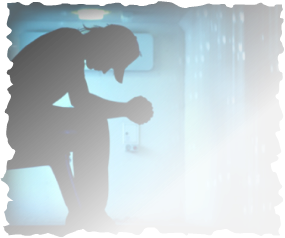
New research out of England shows that around 8% of teenagers are known to engage in self-harming activities, such as cutting and burning, but that the great majority stop hurting themselves by the time they reach adulthood.
Those who self-harmed as teenagers, however, were found to be much more likely to be suicidal later as young adults.
The kids most likely to hurt themselves were the ones under pressure to grow up too soon, too fast, in various respects. "We know from this and other studies that it is those young people who are on the fast track to adulthood -- those kids who are on the margins of their families, the margins of school who are engaged in early sexual activity, who are using alcohol and other drugs at an early age -- this group of kids is at the highest risk of self-harm," said one of the scientists behind the study.
Researchers said the estimates of how many teens self-harm may be too low, since a much larger number may be doing it in complete secret and never seek out help for their problems, thus escaping the notice of the mental health system. Find out more about the motivations behind self-injury here.
Those who self-harmed as teenagers, however, were found to be much more likely to be suicidal later as young adults.
The kids most likely to hurt themselves were the ones under pressure to grow up too soon, too fast, in various respects. "We know from this and other studies that it is those young people who are on the fast track to adulthood -- those kids who are on the margins of their families, the margins of school who are engaged in early sexual activity, who are using alcohol and other drugs at an early age -- this group of kids is at the highest risk of self-harm," said one of the scientists behind the study.
Researchers said the estimates of how many teens self-harm may be too low, since a much larger number may be doing it in complete secret and never seek out help for their problems, thus escaping the notice of the mental health system. Find out more about the motivations behind self-injury here.
Genetic mutation can pave the way to mood disorders: Scottish study
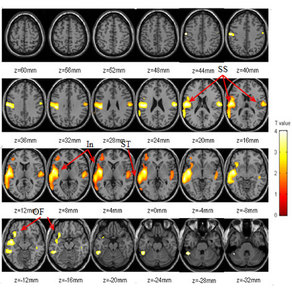
Scottish researchers say that a genetic mutation can set the stage in a person's life to develop brain disorders, including bipolar disorder or schizophrenia. The mutated gene is called DISC1 and plays a role in so-called brain "signaling."
The gene is not all-powerful, however: Even if someone inherits it, researchers found that it's not certain they will develop a psychiatric disorder at all. Apparently the brain is good at compensating and adapting, even at a genetic disadvantage, and no noticeable symptoms may result.
The gene is not all-powerful, however: Even if someone inherits it, researchers found that it's not certain they will develop a psychiatric disorder at all. Apparently the brain is good at compensating and adapting, even at a genetic disadvantage, and no noticeable symptoms may result.
Glenn Close's sister tells of struggles with bipolar illness

Jessie Close, sister of actress Glenn Close, talked to a symposium in Washington this week about her experiences with a mood disorder and how long it took her to accept the need for treatment. Her celebrity sister was there, too.
"Jessie and I are the 12th generation of stiff upper lipped, pull up your socks, do it, don't talk about it, for God sake don't show anything, suck it up, work hard, don't complain, make money, don't spend it, always polish your shoes Connecticut Yankees, with absolutely no vocabulary for mental illness," said Glenn.
Read an essay by both Close sisters about the need to preserve government funding of mental health services, and the short-sightedness of trimming budgets by scaling back public psychiatric resources, here.
"Jessie and I are the 12th generation of stiff upper lipped, pull up your socks, do it, don't talk about it, for God sake don't show anything, suck it up, work hard, don't complain, make money, don't spend it, always polish your shoes Connecticut Yankees, with absolutely no vocabulary for mental illness," said Glenn.
Read an essay by both Close sisters about the need to preserve government funding of mental health services, and the short-sightedness of trimming budgets by scaling back public psychiatric resources, here.
New, leaner Chicago city budget means closure for psych clinics

Speaking of government cutbacks, the new Chicago city budget will close down half of the city's free mental health clinics. Mental health advocates are upset, arguing that Mayor Rahm Emanuel is targeting the most vulnerable portion of the population with the most severe austerity measures. The City Council basically rubberstamped the budget its approval this week.
The mayor's office defended the impending cuts, saying the changes "would allow the City to partner with community providers, delivering needed services at a lower cost while still maintaining a high level of care for uninsured patients."
Some local protesters staged a brief sit-in at the mayor's office to highlight the planned clinic closings. See a news video here.
The mayor's office defended the impending cuts, saying the changes "would allow the City to partner with community providers, delivering needed services at a lower cost while still maintaining a high level of care for uninsured patients."
Some local protesters staged a brief sit-in at the mayor's office to highlight the planned clinic closings. See a news video here.
Mexican-Americans, other Hispanics who are bipolar to be studied

A new federally funded research study will be undertaken over the next five years by the University of Texas-San Antonio, and other affiliated universities, to see how Hispanics are affected by bipolar disorder.
The investigation will focus primarily on those of Mexican heritage, and will use personal interviews to find culturally appropriate ways to pinpoint and treat the illness.
The investigation will focus primarily on those of Mexican heritage, and will use personal interviews to find culturally appropriate ways to pinpoint and treat the illness.
A handful of nuts a day might help keep depression away

Nuts appear to make people's moods improve, according to a new Spanish study. It's not clear why, although nuts do tend to increase serotonin-related chemicals in the brain.
Researchers said it's important not to go nuts over the nuts, though, because of their caloric whallop, but they seem to be beneficial for both mind and body in moderation.
Read a lot more about the health effects of eating nuts at this site.
Researchers said it's important not to go nuts over the nuts, though, because of their caloric whallop, but they seem to be beneficial for both mind and body in moderation.
Read a lot more about the health effects of eating nuts at this site.
Some psychologists stage revolt against DSM-V, draw up petition

Thousands of members of the American Psychology Assn. have signed an on-line petition that criticizes various aspects of the now-in-development DSM-V, the long-awaited fifth version of the Diagnostic & Statistical Manual. The DSM categorizes psychiatric illness by symptoms and is used by most psychiatrists, as well as insurance companies for processing payments. The new version of the DSM is set to be published in 2013.
The rebel psychologists have a variety of complaints about their views being disregarded. Many objections deal with plans to over-classify patients as having psychiatric ailments, such as the elderly and children, even if medication might not truly be needed. "Overall, we're looking at a risk–benefit analysis with primary prevention vs. medicating people who are really closer to that threshold of normality," said one psychologist. View the full petition here.
The rebel psychologists have a variety of complaints about their views being disregarded. Many objections deal with plans to over-classify patients as having psychiatric ailments, such as the elderly and children, even if medication might not truly be needed. "Overall, we're looking at a risk–benefit analysis with primary prevention vs. medicating people who are really closer to that threshold of normality," said one psychologist. View the full petition here.
Fighting seasonal depression with lamps, "artificial sunrises," meds

Fall, and the shift in clocks to earlier daily darkness, can help to trigger SAD (Seasonal Affective Disorder) in some and less serious depressed feelings in many more. The distress is real, but this article details a variety of approaches to help sufferers, from special high-intensity mood lamps to newer kinds of "artificial sunrise" machines that bask your bedroom in light, gradually, early in the morning before you actually get up. Medication options exist, too, as well as lifestyle changes (such as exercise). See one of the artificial sunrise devices on the market here. Sleep experts caution patients to talk to their doctors before trying out artificial light devices due to possible side effects, including mania.
Read more about the effects of the recent clock change on our emotions and bodies.
Read more about the effects of the recent clock change on our emotions and bodies.
Heartbearn drugs work, but may not be needed, or side effect-free
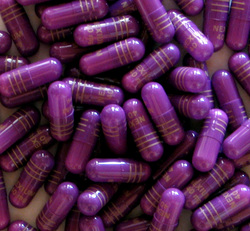
A lot of people on psych drugs also use medication for heartburn/acid reflux. Psych drugs can cause significant weight gain, and this in turn adds to the risk of digestive problems. Consumption of over-the-counter proton-pump inhibitor drugs, such as Prilosec and Prevacid, is quite high in the U.S. But now some experts are saying people often are taking these drugs when they don't need to, when other drugs might be sufficient that are less costly and which have less troublesome side effects, or in cases where simple diet changes might be enough (take a pass on the hot tamales or chocolate, take fewer pills).
Read consumer advice about proton-pump inhibitor drugs and other heartburn meds, and who needs them, here.
Read consumer advice about proton-pump inhibitor drugs and other heartburn meds, and who needs them, here.
Suicide often can be prevented through better screening
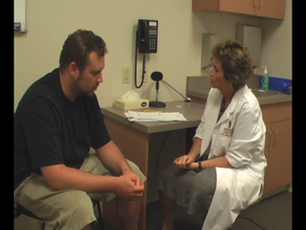
The nation's suicide rate could be a lot lower if doctors and mental health professionals took more care to administer written screening tests to potentially depressed patients -- screening that appears to be quite effective in predicting who might try to kill themselves later, a study has found.
See an example of a suicide risk assessment form here. Learn more about the Columbia Suicide Rating Scale -- the tool used by the researchers cited above to evaluate teens and adults -- from this article.
See an example of a suicide risk assessment form here. Learn more about the Columbia Suicide Rating Scale -- the tool used by the researchers cited above to evaluate teens and adults -- from this article.
Dads having mental illness appears linked to kids' psych problems

The risk of children getting older and developing emotional problems seems to be higher if their fathers were depressed, or had other serious psychiatric illness, when the children were growing up or were teenagers. A study by New York researchers that will be published in December posits that dads' psychiatric illness seems to negatively influence their kids, though mental illness among mothers is even more detrimental. Much previous research had looked mainly at mothers' emotional problems.
In other research this year, mothers who had post-partum depression had brain scans that showed their infant children had unusual brain features that might affect how they respond to stress in their environments.
In other research this year, mothers who had post-partum depression had brain scans that showed their infant children had unusual brain features that might affect how they respond to stress in their environments.
Insomnia and depression are intertwined, a new study confirms

Does sleeplessness trigger depression or does a depressed mood lead to insomnia? Apparently both are true. A new study out of Japan (where insomnia reportedly affects a big segment of society) showed that people who have trouble sleeping are two times as likely, or more, to go on to suffer from depression later on. So researchers are saying doctors need to be more mindful of patients' complaints of sleep troubles, viewing them as a red flag for possible later depression. The Japanese also found insomnia is very common among people already depressed -- verifying a belief widely held by psychiatry already.
Read much more about sleep problems and depression, and which causes which, here.
Read much more about sleep problems and depression, and which causes which, here.
Will a psychosis be short, long, mild, bad? MRI might hold clues
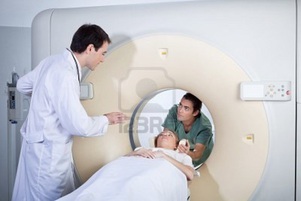
Scientists in England have discovered in a study that patients who have psychotic symptoms, such as those with schizophrenia or severe bipolar disorder, have distinct brain scans, as measured by an MRI, that can be used to predict how bad the psychotic episode will be. Scientists said "we have shown that in principle it should be possible to use brain scans to identify...patients who are likely to go on to have a continuous psychotic illness and those who will develop a less severe form." Treatment then can be tailored more individually to the particular patient.
Mental health courts keep psych patients out of jail -- sometimes

What happens when someone with a mood disorder commits a serious crime, even though they essentially aren't "themselves"? Often, they wind up convicted of crimes and must serve prison time. But some states and counties have set up mental health courts as a way to divert mentally ill people out of the usual court process, bring advocates and doctors together with defense attorneys and prosecutors, and find alternatives to jail. One such program exists in Utah, and you can read about how it works here.
Of course, there are still many thousands of inmates in prisons and jails with psychiatric illnesses who didn't have the luck of being heard by a mental health judge. This excellent, in-depth story in a Springfield, Missouri newspaper details the lives of mentally ill prisoners and the scarce services that are available to treat them. "Although mentally ill inmates receive some services in jail, they are often released without a path to continue treatment," the reporter writes. "With what many perceive as a lack of community resources, the cycle continues."
For much more about the mentally ill who wind up in prison, here is a PBS "Frontline" program on the issue.
Of course, there are still many thousands of inmates in prisons and jails with psychiatric illnesses who didn't have the luck of being heard by a mental health judge. This excellent, in-depth story in a Springfield, Missouri newspaper details the lives of mentally ill prisoners and the scarce services that are available to treat them. "Although mentally ill inmates receive some services in jail, they are often released without a path to continue treatment," the reporter writes. "With what many perceive as a lack of community resources, the cycle continues."
For much more about the mentally ill who wind up in prison, here is a PBS "Frontline" program on the issue.
Blood tests for mental illness not accurate today, experts say
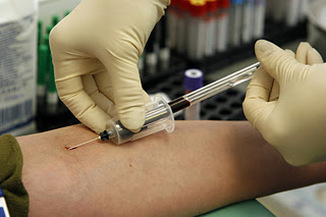
Despite the claims of some laboratories that are touting blood tests for depression or schizophrenia, which are often very expensive, doctors say there's no reason to trust the accuracy of these tests right now. Maybe blood tests will be an important tool in the psychiatrist's arsenal in the future, they argue, but they won't tell doctors much they can't learn through questioning. “If we are using biomarkers to diagnose a disease or to predict disease risk, what we are really doing is substituting a biochemical test for what should be a thorough clinical examination,” one expert says. “At present, there is nothing a biomarker will tell us that a seasoned, experienced clinician wouldn’t be able to determine in a full psychiatric evaluation."
Steve Jobs: Brilliant, strange, unpredictable. Also bipolar?

A fascinating essay in the New York Times takes a rather unusual look at the late Apple founder, not so much exalting him as a historic inventor but questioning whether his many strange behaviors and quirks could have been evidence of a "mild" form of bipolar disorder. The story depicts Steve Jobs's many severe ups and downs and shifts in behavior that kept friends and colleagues guessing. "There were Rasputin-like seductions followed by raging tirades. Everyone was either a hero or bozo," writes the columnist after reading the new Jobs biography.
Do Americans need to take so many antidepressants?
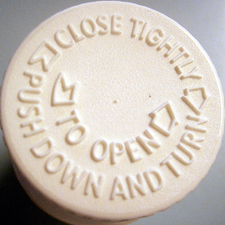
Antidepressants apparently help some people through their dark periods, and most experts would say they surely can be useful for extremely ill, clinically depressed persons. But some observers, such as the writer of this book review, believe they are prescribed far too often and that people who aren't truly depressed anymore stay on them for much too long.
New data shows 14% of people who take these pills have been on them for at least 10 years. Some research shows antidepressants help people to feel better about as well as placebos do, so these more skeptical doctors feel that people who do take antidepressants should try to go off of them (with physicians' knowledge) and perhaps try other approaches that could make them less depressed, such as getting more exercise, exploring feelings through psychotherapy, volunteering or attending support groups, and other non-medication strategies.
Read more about new discoveries about the "placebo effect" and antidepressants here.
Doctors sometimes admit that just about any positive, action-oriented steps can help depression to get better. Depressed people just need to feel like they are doing things to contribute to wellness, things that might make a difference. Breaking out of current habits, overcoming inertia and trying new activities are, undeniably, the hardest part.
New data shows 14% of people who take these pills have been on them for at least 10 years. Some research shows antidepressants help people to feel better about as well as placebos do, so these more skeptical doctors feel that people who do take antidepressants should try to go off of them (with physicians' knowledge) and perhaps try other approaches that could make them less depressed, such as getting more exercise, exploring feelings through psychotherapy, volunteering or attending support groups, and other non-medication strategies.
Read more about new discoveries about the "placebo effect" and antidepressants here.
Doctors sometimes admit that just about any positive, action-oriented steps can help depression to get better. Depressed people just need to feel like they are doing things to contribute to wellness, things that might make a difference. Breaking out of current habits, overcoming inertia and trying new activities are, undeniably, the hardest part.
Grappling with stress at holiday time
|
|
|
If the holidays tend to get you down while everyone else seems to be getting into the spirit of the season, you're not alone, and why you're feeling down might have many causes. The above videos, taped by Mark G. Agresti, M.D, a South Florida psychiatrist, offer some insight into the causes of holiday stress. He suggests everything from keeping regular schedules to getting "alone" time to drinking more water. It's nice to see a psychiatrist who's suggesting sensible lifestyle changes instead of a purely medication-oriented approach to calming down or cheering up.
The Mayo Clinic also gives some tips on identifying your sources of Yuletide depression, ranging from strained relationships with family to the annual challenge of shopping for gifts.
The Mayo Clinic also gives some tips on identifying your sources of Yuletide depression, ranging from strained relationships with family to the annual challenge of shopping for gifts.
Anti-smoking drug Chantix linked to depression, anxiety, suicides
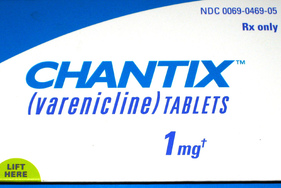
Despite a study released just last month finding that the tobacco cessation drug Chantix didn't appear to increase the risk of being admitted to a psych ward, new research shows a worrisome connection between the drug (also sold as Champix) and depression, suicide attempts and actual suicide. The connection seems to be 10 times worse than for users of Zyban (which is the same as the antidepressant Wellbutrin). Doctors are strongly recommending trying a variety of approaches to kicking the habit before turning to medication.
Country music star's wife talks about his bipolar crises

T. Graham Brown, a country music star several years ago, once came out with an autobiography detailing his struggles with alcoholism. But a new interview with his wife details how he was also facing bipolar disorder, and how it affected his personal life and career. "Bipolar people do not want to take medicine," his wife (and manager), Sheila, says in the interview. "It’s the only disease where your mind tells you not to take it. Your mind is telling you that everyone else is crazy -– you’re perfectly fine. When they’re in a manic state, they believe they’re very productive and creative, but they’re also quite destructive. It’s a very strange disease."
Big study finds genetic dimensions to bipolar-caused psychosis

Two vast studies of thousands of people with bipolar disorder and schizophrenia have confirmed previous theories that psychosis connected to each illness may be determined by genes. Researchers also found significant overlap between the genes thought to be connected to bipolar illness and schizophrenia. "Unravelling the biology of these disorders brings great hope for the development of new therapies -– we can attempt to develop therapeutic drugs which target the molecules in the brain involved in the development of psychosis," says one of the researchers behind the study.
Men binge eat, too -- but most of what doctors know is about women

Binge eating is often thought of as a chiefly female disorder (or symptom) but a new study found large numbers of men also periodically binge -- many more than previously thought. Just about all academic knowledge of binge eating comes from treatment of women, though. "There is concern that men may be reluctant to seek treatment, or health care providers may be less likely [to] detect a disorder in a male patient, because eating disorders are widely seen as female problems," a study author says. Read more about men and binge eating here.
Track your daily or weekly ups and downs with mood tracking tools
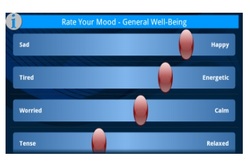
Many doctors and therapists recommend that people with mood disorders attempt to keep track of their high, low and in-between periods in a formal way. A mood tracker can be as simple as a piece of graph paper with a scale that you design yourself, but many Web sites have ready-made mood tracking software you can use right away. The idea is to share the trends that you notice, over time, with your psychiatrist or therapist. Mood 24/7 is one tool that allows you to get mood-charting reminders by cell phone text or email. Another tracker is found at PsychCentral.com and provides detailed plotting of graphs that show your mood changes over time.
Do better mattresses or "noise machines" make us sleep better?

Specialists recommend seven to nine hours of sleep nightly, but when asked about whether people should make an investment in expensive mattresses, doctors in this New York Times article said they really had no evidence either way. The article's author has high praise for a "white noise" machine that lulls her to sleep by blocking out street sounds. (It sounds similar to a noisemaking device that both my Mom and I tried years ago. It imitated rivers flowing, the ebb and flow of surf on the beach, heartbeats -- more freaky than soothing, in my recollection -- and other sounds.) Read more about how lack of sleep affects our moods here.
Psychiatrists, in short supply, are teaching the trade to primary docs

Psychiatrists at Mayo Clinic talked this week about how the United States is in the midst of a serious shortage of psychiatrists. The situation appears especially worrisome when it comes to child psychiatrists. They are very scarce. Psychiatrists nationwide have started holding training workshops for family physicians, internists and pediatricians to teach them the basics of psychiatric diagnosis and treatment, though they recognize it's an imperfect solution. Now more primary care doctors are dealing with patients' psychiatric problems than ever before.
Teen runaways grow up to have more suicidal thoughts, actions

Adolescents who run away from home, when they become adults, have a 51% greater chance of having suicidal thoughts than those adults who didn't run away as teenagers, a new report issued this week by the National Runaway Switchboard says. Even more startling: Adults are three times more likely to try to kill themselves if they ran away as teens. The report also highlighted data showing that gay, lesbian and bisexual adults who ran away when they were teens have far more suicidal thoughts and actions when they are grown. Many gay teens appear to wind up the victims of exploitation, selling themselves on the street to survive. Read more on that here.
Depressed elderly people, and aging Boomers, resist seeking help
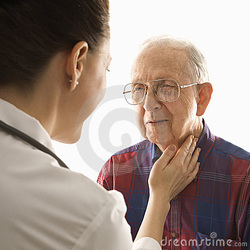
Older people who feel depressed may be especially resistant to getting the help they need, according to this nursing executive. Either they think their depressed feelings are to be expected, or they're just hesitant to be open to friends or family about their problems. "Oftentimes, seniors view an admission of depression to a loved one or their doctor as an additional burden to the person that is caring for them," says the author. "Still others may view their depression as a normal part of aging, or something transient that they 'can fix' on their own without outside help."
Tough economy, economic pressures fuel anxiety disorders

Generalized anxiety disorder can cause people to feel on edge in any circumstance, but the author of this essay, a clinical psychologist, thinks the current recession is especially rough on younger people who believe they have to keep working hard, all the time, just to keep from falling behind.
“It used to be that if you got a good education, you would get a good job," says the therapist. "But today, young people are uncertain about finding a job, they have a lot more debt, they are working while studying, finishing later, more fatigued and some are starting families while still in school, and juggling all of this causes a great deal of stress."
Learn about one way to fight anxiety, mindfulness, at this site.
“It used to be that if you got a good education, you would get a good job," says the therapist. "But today, young people are uncertain about finding a job, they have a lot more debt, they are working while studying, finishing later, more fatigued and some are starting families while still in school, and juggling all of this causes a great deal of stress."
Learn about one way to fight anxiety, mindfulness, at this site.
Loneliness is found to be linked to sleep troubles

Researchers have discovered that people who are lonely seem to have a more troubled night's sleep, with frequent wakings, than people who say they aren't lonely. Chicago researchers studied members of a communal sect in South Dakota and found the more socially connected they felt, the better they slept at night. For a comprehensive discussion of sleep problems and their causes (including, sometimes, antidepressants) read this article by a psychologist and sleep expert.
Dealing with "antidepressant discontinuation syndrome"

You've no doubt heard that it's best to taper off an antidepressant gradually (in many cases) or you might feel sick.
Antidepressant discontinuation syndrome, as the psychiatrists have named it, is short-term but may feel quite lousy. The signs may include anxiety, dizziness and feelings of sadness. More information is available here, at a Web page of the American Academy of Family Physicians. This page contains a great deal of information about antidepressant usage, safety, and side effects. Can you safely take antidepressants while drinking alcohol? This article covers it.
Antidepressant discontinuation syndrome, as the psychiatrists have named it, is short-term but may feel quite lousy. The signs may include anxiety, dizziness and feelings of sadness. More information is available here, at a Web page of the American Academy of Family Physicians. This page contains a great deal of information about antidepressant usage, safety, and side effects. Can you safely take antidepressants while drinking alcohol? This article covers it.
More fish? Supplements? The jury is still out on Omega-3

For many years, some psychiatric patients have been trying to increase intake of Omega-3 fatty acids as a way to combat or deter depression, based on a few studies that pointed to antidepressant properties of these chemicals (which are found in some fish and some other foods). This column by an Emory University psychiatrist is encouraging to those who want to take Omega-3 pills, or eat foods rich in the nutrient -- to a point.
It seems that some research does point to Omega-3 as an effective tool for helping to prevent depression. The caveat is that placebos may work just as well. Once again, any positive "action step" seems to make people feel better. Read more about EPA, the form of Omega-3 that appears to work best against depression, here at WebMD.
It seems that some research does point to Omega-3 as an effective tool for helping to prevent depression. The caveat is that placebos may work just as well. Once again, any positive "action step" seems to make people feel better. Read more about EPA, the form of Omega-3 that appears to work best against depression, here at WebMD.
Understanding, treating sleep apnea can improve mood, weight
Sleep apnea, a disorder that causes people to periodically stop breathing while they sleep, over and over again throughout the night, can have real effects on daytime mood, weight, the heart, and a variety of other health issues. Daytime drowsiness and irritability, as well as depression, often are greatly improved when the apnea is treated and normal sleep is restored. This video segment, from Rosie O'Donnell's "The View" a few years ago, gives the essentials. And here is more about sleep apnea and its impact on depression.
Doctor: Labeling young kids with "mood dysregulation" serves no one

A committee that's working on the revision of the Diagnostic & Statistical Manual (DSM-V) is considering creating a billable diagnosis of "mood dysregulation" for little kids who essentially throw tantrums. This pediatrician writes that it's a wrongheaded approach, mainly driven by the need of insurance companies to strictly classify disorders. The doctor says kids' mood problems do sometimes need to be professionally treated, but that creating yet another category is not necessary and will lead to even more children being given antipsychotics without need -- something she said has already skyrocketted with regard to diagnosis of child bipolar disorder.
To see how the doctors at Massachusetts General Hospital describe children's mood disorders, see this comprehensive Web page.
To see how the doctors at Massachusetts General Hospital describe children's mood disorders, see this comprehensive Web page.
Health advocates say Chicago-area psych hospital shouldn't close

Illinois Governor Patrick Quinn has proposed cutting the state's budget, in part, by closing Tinley Park Mental Health Center, two other state psychiatric hospitals, as well as two centers for the developmentally disabled. Where would those patients go for treatment? No one seems to know, least of all their families. Members of the National Alliance on Mental Illness condemned the plans this week as a terribly misguided weakening of an already-thin safety net. Read an open letter to the governor, sent by various state legislators and other officials, here. It says closing Tinley Park is wrong.
